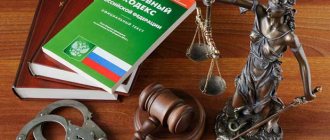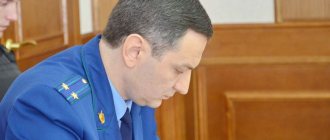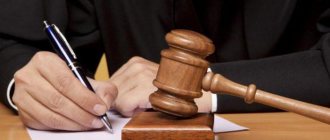The role of the prosecutor in criminal proceedings of the Russian Federation
The prosecutor (Latin procurare - to manage, to be in charge of something, to take care) is the main legal representative of the prosecution in common law countries that have adopted an adversarial system. He is responsible for presenting the case against the person accused of committing a crime. The functions of prosecutors in different countries are different and are largely determined by historical conditions.
In Russia, a prosecutor is an official of the prosecutor's office whose tasks include exercising prosecutorial supervision and maintaining state prosecution in criminal proceedings.
In the economic and legal literature, the following definitions of “prosecutor” can be distinguished (see Table 1):
Table 1
Concepts of “prosecutor”, terminology
| Authors | Definitions |
| Kurakov L. P. [5] | Prosecutor is an official of the prosecutor's office, vested with the authority to exercise prosecutorial supervision. According to the Federal Law “On the Prosecutor's Office of the Russian Federation”, prosecutors, in accordance with the procedural legislation of the Russian Federation, participate in the consideration of cases by courts, protest decisions, sentences, rulings and rulings of courts that are contrary to the law. |
| Radko T. N. [6] | A prosecutor is an official of a unified centralized system - the Prosecutor's Office of the Russian Federation, which exercises supreme supervision over compliance and correct application of laws by all bodies, enterprises, institutions, organizations, officials and citizens. The term “prosecutor” applies to persons heading the relevant divisions of the prosecutor’s office system: regions, city, district, inter-district, as well as other equivalent prosecutor’s offices. This term applies to both deputy and assistant prosecutors if they participate as a prosecutor in a trial. The basic rights (powers), duties and forms of activity of the prosecutor are determined by the Law “On the Prosecutor’s Office”. |
| Serebrova S. P. [7] | Prosecutor is an official participating in criminal proceedings and vested with appropriate powers in accordance with the Federal Law “On the Prosecutor’s Office” |
In accordance with Part 1 of Article 246 of the Criminal Procedure Code of the Russian Federation (hereinafter referred to as the Code of Criminal Procedure of the Russian Federation), the participation of the prosecutor in the trial is mandatory. The state prosecutor (prosecutor) participates in the court's consideration of criminal cases of public and private-public accusations, and in cases of private prosecution - the victim [1].
Article 31 5 of the Code of Criminal Procedure of the Russian Federation defines the prosecutor as follows: “The Prosecutor General of the Russian Federation and the prosecutors subordinate to him, their deputies and other officials of the prosecutor’s office participating in criminal proceedings and vested with appropriate powers by the federal law on the prosecutor’s office” [1].
It is important to note that the Code of Criminal Procedure of the Russian Federation is not mentioned in this definition as a regulator of the rights and duties of prosecutors (their official powers) - the leading role is given to the Federal Law “On the Prosecutor’s Office” [2]. Taking into account the fact that, as a general rule, official powers cannot be interpreted in the direction of expansion, it turns out that the prosecutor participating in criminal proceedings is vested only with those powers that are granted to him by the Federal Law “On the Prosecutor’s Office”, which contradicts Part 2 of Art. 1 and Art. 7 Code of Criminal Procedure of the Russian Federation. In addition, the wording “and other officials of the prosecutor’s office” allows us to include in the concept of “prosecutor” and investigator of the prosecutor’s office [1,2].
The procedural law specifies: “The prosecutor is an official authorized, within the competence established by this code, to carry out criminal prosecution on behalf of the state during criminal proceedings, as well as supervision over the procedural activities of inquiry bodies and preliminary investigation bodies” (Part 1 of Article 37 Code of Criminal Procedure of the Russian Federation). As you can see, here one of the elements of the prosecutor’s status is the presence of competence established by the Code of Criminal Procedure of the Russian Federation [1].
One might assume that the definition of paragraph 31 of Art. 5 of the Code of Criminal Procedure of the Russian Federation is a mistake, a technical defect of the legislator, if not for the second half of Part 1 of Art. 37 of the Code of Criminal Procedure of the Russian Federation, which again points to the concept used in the Federal Law “On the Prosecutor’s Office of the Russian Federation”, namely supervision [1,2].
It should be noted that nowhere else in the text of the Code of Criminal Procedure of the Russian Federation is there any mention of prosecutorial supervision. At the same time, part 2, paragraph 17, art. 37 of the Code of Criminal Procedure of the Russian Federation provides for the prosecutor the opportunity to “exercise other powers provided for by this Code,” i.e., it again “closes” his competence to the Code of Criminal Procedure of the Russian Federation [1].
In a comparative analysis of the above provisions of paragraph 31 of Art. 5 and art. 37 of the Code of Criminal Procedure of the Russian Federation reveals significant contradictions in the definition of the prosecutor as a participant in criminal proceedings. On the one hand, a prosecutor is understood as an official of the prosecutor’s office (and an investigator of the prosecutor’s office as well); on the other hand, the law directly indicates the mandatory nature of its provisions and adherence exclusively to the norms of the Code of Criminal Procedure of the Russian Federation, while at the same time establishing the possibility of the prosecutor using powers not provided for by the Code . At the same time, the Code of Criminal Procedure of the Russian Federation indicates that the powers of the prosecutor are exercised by prosecutors of the district, city, their deputies, prosecutors equivalent to them and higher prosecutors (Part 6 of Article 37), i.e., it specifically names the list of positions to which the provided provisions can be applied them powers [1,8].
The concept of the prosecutor as a participant in the criminal process has not been formed in the Code of Criminal Procedure of the Russian Federation and it turns out that the function of the prosecution is assigned not to a specific participant in the criminal process, who embodies the prosecution side within the framework of justice, but to the entire apparatus of law enforcement agencies as a whole. Under such circumstances, it is unacceptable to say that our country has made a transition from repressive punitive criminal procedure legislation to democratic legislation that ensures the implementation of the basic principles of legal proceedings of international standards.
According to lawyer R.P. Chernov, by separating the concepts of “state prosecutor” and “prosecutor”, the legislator will take a big and important step towards structuring the rule of law in Russia. The state prosecutor, who is not related to the prosecutor’s office and is not supervised by it as a participant in criminal proceedings, is that element of the justice system that today can radically change the situation in favor of objective, unbiased, fair proceedings in Russia [8].
Maintaining the state prosecution in court is the continuation of the criminal prosecution of a person or group of persons who have been charged with a crime, begun in pre-trial proceedings. The complexity and multi-stage nature of the work of the public prosecutor necessitate its implementation on a clear organizational basis, with consistent preparation, including a thorough study and analysis of the materials of the criminal case, development of a plan for participation in the judicial investigation - the central part of the trial, determination of the order of presentation of evidence, thoughtful presentation in court debates .
The powers of the prosecutor in the trial are reflected in Articles 37 and 246 of the Code of Criminal Procedure of the Russian Federation [1].
The prosecutor has the right:
a) participate in court when considering the issue of choosing a preventive measure in the form of detention, extending the period of detention or canceling or changing this preventive measure, when considering petitions for other procedural actions by investigative bodies that are allowed on the basis of a court decision , when considering complaints in the manner established by Article 125 of the Code of Criminal Procedure of the Russian Federation.
b) when considering criminal cases in courts, the prosecutor supports the state prosecution, ensuring its legality and validity.
c) in accordance with Article 246 of the Code of Criminal Procedure of the Russian Federation, the prosecutor participates in all criminal cases of public and private-public prosecution, as well as in criminal cases of private prosecution, if the case was initiated by the investigator or inquiry officer with the consent of the prosecutor.
The state prosecutor presents evidence and participates in its examination, expresses to the court his opinion on the merits of the charge, as well as on other issues arising during the trial, makes proposals to the court on the application of the criminal law and the sentencing of the defendant.
d) the prosecutor brings or supports a civil claim brought in the case, if this is required by the protection of the rights and legitimate interests of citizens.
e) if the prosecutor during the trial becomes convinced that the evidence presented does not support the accusation, he refuses the charge and sets out to the court the reasons for the refusal in the manner and on the grounds provided by law.
f) the prosecutor has the right to change the charge towards mitigation before the court leaves for the deliberation room.
g) the prosecutor brings to a higher court an appeal or cassation presentation within the time limits established by law against an illegal or unfounded court decision.
h) the prosecutor, regardless of participation in the trial, has the right, within the limits of his competence, to request from the court any criminal case in which the decision, sentence, ruling or decree of the court has entered into legal force. Having noticed that the court decision is subject to change or cancellation, the prosecutor makes a submission by way of supervision.
As a result of the 2007 reform, the prosecutor ceased to be the subject carrying out the preliminary investigation. However, in a number of countries in continental Europe, the prosecutor still retains this function.
Federal Law No. 404-FZ of December 28, 2010 “On amendments to certain legislative acts of the Russian Federation in connection with improving the activities of preliminary investigation bodies” completed the process of separating investigative units from the prosecutor’s office of the Russian Federation, which began in 2007 [3].
The positive aspects of the reform were the definition of the prosecutor's office at the pre-trial stage of criminal proceedings exclusively as a supervisory body and the formation of an independent investigative unit - the Investigative Committee of the Russian Federation, designed to investigate particularly serious, economic, corruption and other significant crimes.
It is important to note that V.A. Ponevezhsky, a member of the State Duma Committee on Constitutional Legislation and State Building, introduced a bill to the State Duma expanding prosecutorial supervision over the activities of the Investigative Committee of Russia.
“The adoption of the bill will eliminate conflicts associated with different interpretations of the provisions of the federal law “On the Prosecutor’s Office of the Russian Federation”, increase the efficiency of prosecutorial supervision over the observance of human and civil rights and freedoms in the activities of officials of the Investigative Committee of the Russian Federation, not related to the implementation of the preliminary investigation,” - states the explanatory note to the bill [9].
According to the current version of the law on the prosecutor's office, supervision is carried out in relation to federal ministries, state committees, services and other federal executive bodies, but there is no mention of the Investigative Committee as a federal government body, the observance of the law in whose activities the prosecutor's office supervises.
As a result of this interpretation, the prosecutor's office is deprived of the opportunity to monitor compliance by the Investigative Committee of the Russian Federation and its territorial bodies with the requirements of the Constitution of the Russian Federation, human and civil rights and freedoms in the field of labor legislation, legislation on the federal public service, on anti-corruption and on arms trafficking.
The draft amends Art. 1, 21 and 26 of the Federal Law “On the Prosecutor’s Office of the Russian Federation” [2], these changes are necessary to bring the articles into compliance with the provisions of the federal law “On the Investigative Committee of the Russian Federation” [4].
Literature:
- Criminal Procedure Code of the Russian Federation" dated December 18, 2001 N 174-FZ (as amended on December 1, 2012)
- Federal Law of January 17, 1992 N 2202–1 (as amended on December 3, 2012) “On the Prosecutor’s Office of the Russian Federation”
- Federal Law of November 6, 2011 N 297-FZ “On Amendments to the Federal Law “On the Prosecutor’s Office of the Russian Federation”
- Federal Law of December 28, 2010 N 403-FZ (as amended on December 3, 2012) “On the Investigative Committee of the Russian Federation”
- Kurakov L.P., Kurakov V.L., Kurakov A.L. Economics and law: dictionary-reference book 2004.
- Radko T. N. The theory of state and law in schemes and definitions, textbook. - M. Prospekt, 2011 - 135 p.
- Serebrova S.P. Concepts of modern criminal proceedings. https://determiner.ru/dictionary/221
- Chernov R.P. On the figure and status of the prosecutor in criminal proceedings https://pravorub.ru/articles/1547.html
- https://www.gazeta.ru/news/seealso/1782473.shtml
Powers and responsibilities in judicial proceedings
The competence of the prosecutor includes the following:
- Supervision of compliance with the law in the process of investigating crimes.
- Transmission of written instructions during the consideration of the case.
- Cancellation of acts of lower-level prosecutors if they were adopted unreasonably.
- Participation in the hearing on the side of the prosecution. Sometimes – representing the interests of a party in civil proceedings.
- Submitting a petition to change the preventive measure.
- Removal of the investigator from the process if facts of violations are presented.
- Signing the indictment.
- Familiarization with the case materials.
- Proving a person’s guilt by presenting arguments and facts.
- The right to refuse criminal prosecution.
- Resolving disagreements with the help of the Prosecutor General.
Who is more important, who has more significant opportunities
It cannot be said unequivocally that a judge is superior to a prosecutor. The activities of these persons are regulated by various regulations. Their tasks during the trial do not overlap, but only complement each other. It would be incorrect to compare the competence and hierarchy of these individuals.
It is also worth determining who has more opportunities. During the meeting, the judge allows the participants in the process to speak, ensures order, and appoints additional examinations if necessary. The prosecutor can also order research, he has the right to return materials for further investigation, like the judge, to present his own arguments and evidence. The capabilities of the judicial body include making a decision on the guilt or innocence of a person, imposing punishment or rehabilitation.
It can be concluded that the capabilities of the parties during the process are somewhat similar. Both specialists analyze the presented and collected facts and arguments, order additional investigations, and invite experts. The prosecutor has the right to propose his own type of punishment to the perpetrator if it is justified. The judge may agree with the proposed measure or make his own decision.




